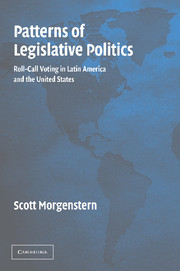Book contents
- Frontmatter
- Contents
- Tables and Figures
- Preface and Acknowledgments
- Party, Faction, and Coalition Names and Abbreviations
- 1 Patterns of Legislative Politics: Identifiability and Flexibility
- 2 Representation and the Agent System
- 3 Identifying Agents
- 4 Influences on Agent Unity: Discipline and Cohesion
- 5 Explaining Voting Unity
- 6 Policy Coalitions and Agent Flexibility
- 7 Conclusion
- Bibliography
- Subject Index
- Author Index
7 - Conclusion
Published online by Cambridge University Press: 24 July 2009
- Frontmatter
- Contents
- Tables and Figures
- Preface and Acknowledgments
- Party, Faction, and Coalition Names and Abbreviations
- 1 Patterns of Legislative Politics: Identifiability and Flexibility
- 2 Representation and the Agent System
- 3 Identifying Agents
- 4 Influences on Agent Unity: Discipline and Cohesion
- 5 Explaining Voting Unity
- 6 Policy Coalitions and Agent Flexibility
- 7 Conclusion
- Bibliography
- Subject Index
- Author Index
Summary
With apologies to E. E. Schatschneider (1942, p. 1), “modern democracy is unthinkable save in terms of” agents. The agents that we have explored in this book take many different forms, ranging from highly unified (identifiable) collective actors to relatively independent legislators grouped into loose conglomerations of parties, factions, delegations, or coalitions. I have argued here that the agents' different forms, and the interactions among them, define the patterns of legislative politics and thus have important implications for representation and democratic governance.
Earlier theorists have also been concerned with flexibility and identifiability. Madison's worry was that “factions” would generate rigid barriers, excluding minorities. More recent theorists have been concerned with accountability, especially in multiagent systems. Stokes (2001b), for example, focuses on the particular requirements that allow voters to identify the hero or villain responsible for the given economic situation. The first characteristic she notes is a clear ruling majority, because “people may have difficulty attributing responsibility under coalition, minority, or divided governments” (p. 14). Powell (1999) finds that concentrating power in a majoritarian system “is necessary, although not sufficient, for citizen control” (p. 5). At the same time, he follows J. S. Mill in arguing about the importance of multiple “representative agents …[that] bargain with each other in a flexible and accommodative fashion” (p. 6).
Powell is concerned that these two goals of democratic governance are incompatible because they imply two different views of the citizen-legislator link.
- Type
- Chapter
- Information
- Patterns of Legislative PoliticsRoll-Call Voting in Latin America and the United States, pp. 188 - 202Publisher: Cambridge University PressPrint publication year: 2003



